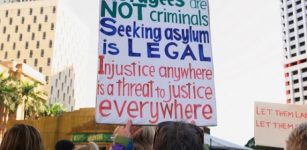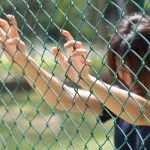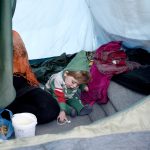Lawyers Call for Criminal Charges Against Australian Government

In a petition to the International Criminal Court (ICC), the Global Legal Action Network (GLAN) and the Stanford International Human Rights Clinic have described the “harrowing practices of the Australian state and corporations towards asylum seekers” as a crime against humanity.
Australian detention regime
Australia’s system of offshore detention is now supported by both major political parties.
About 2000 men, women and children are currently held on Nauru and Manus Island, about 1,500 of whom have been formally recognised as refugees, meaning they have established a well-founded fear of persecution in their homelands.
Most refugees have been held on the islands for more than three years, with no dates set for release.
The detention centres are privately run by the Spanish infrastructure giant Ferrovial, under contract from the Australian government. Ferrovial took control of the Australian company Broadspectrum in May 2016.
The Australian government exercises strict control over information released from the detention centres, restricting access to journalists and relying upon laws which make it a crime to publish about human rights abuses.
Government agents have hired investigators to “aggressively” pursue the sources of Guardian journalists who disclosed human rights abuses at the centres and to monitor people who are sympathetic to the plight of asylum seekers, including Greens Senator Sarah Hanson-Young.
The Australian Federal Police have opened a special division to investigate whistleblowers, compiling extensive reports about charity groups such as Save the Children and outspoken professionals including former detention centre psychiatrist Dr Peter Young.
Details of petition
The petition asks the office of the ICC prosecutor to open an investigation into “crimes against humanity committed by individuals and corporate actors”.
GLAN argues that leaks about the physical and sexual abuse of adults and children at the centres are evidence of the inhumanity of the existing regime.
The leaks, including the Guardian’s Nauru files, have detailed numerous accounts of physical and sexual abuse, including against children, and widespread self-harm and suicide attempts.
Dr Peter Young believes that Australia’s detention environment is “inherently toxic” and meets the definition of torture in international law. Traumatologist Paul Stevenson describes the detention regime as the worst “atrocity” he has seen in 40 years of trauma counselling.
GLAN has reported that “[t]he conditions and resulting hopelessness have caused what experts describe as ‘epidemic levels’ of self-harm among those held on these islands”, adding that “[b]ased on original research, the… [ICC petition] is the most comprehensive submission on crimes against humanity perpetrated outside of context of war.”
Prosecuting the Australian government
While the ICC has the power to prosecute government and other state officials who have ratified international instruments, commentators suggest that action against Australia is unlikely.
Before a prosecution can commence, ICC prosecutors need to be convinced that Australia’s conduct constitutes “a widespread or systematic attack directed against any civilian population, with knowledge of the attack.”
Article 7 of the Rome Statute defines a crime against humanity as, among other things, “deportation or forcible transfer of populations; imprisonment or other severe deprivation of physical liberty in violation of fundamental rules of international law”.
Diala Shamas, a law lecturer at Stanford’s International Human Rights and Conflict Resolution Clinic, argues that the comprehensive submission to the ICC provides sufficient evidence that Australian government officials, as well as some of their corporate contractors, may be liable for crimes against humanity.
Geopolitical situation
Dr Ioannis Kalpouzos, a lecturer at the University of London’s City Law School and chairman of GLAN, believes Australia’s hardline policies on immigration are setting a dangerous precedent, with many right-leaning European regimes seeking to follow our lead.
“We are witnessing the normalisation of crimes committed against the world’s most vulnerable population – refugees,” Kalpouzos remarked. “The prosecutor must recognise the gravity of the situation and prevent this.”
Diala Shamas says that“[a]t a time when global powers including the United States are shutting their doors to refugees, it is crucial for international legal institutions to protect them”.
The ICC is expected to take several months to consider the petition.







